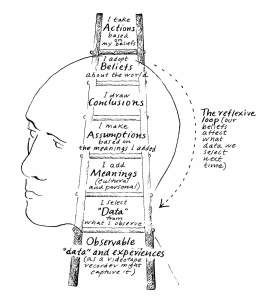Inference and Uncertainty
- Maurizio Cortesi, Ph.D. - Zegtraining
- May 15, 2015
- 2 min read
I stumbled upon a very interesting article by Ed Batista discussing a well-known model by Argyris, the ladder of inference. The model describes how we make sense of reality, and move from a bunch of data to decisions and actions.
Now, the model proposed in the post is admittedly a simplified version of a ladder that normally considers seven steps (as in the picture below, from The Fifth Discipline by Peter Senge). Briefly, from a bunch of data we observe (1), we need to select (2) which ones to focus on. Information is often too much for us to deal with it completely, so focusing on something and discarding something else is necessary. On the basis of selected data, we begin making sense of the data, giving them meaning (3). This process is done considering our own cultural and individual perspectives. We then bring in our assumptions (4) and come to draw conclusions (5) about the data we observed. Conclusions confirmed over time become beliefs (6) and lead us to decisions and action (7).

Ed Batista points out many of the problems that result from our way of making sense of reality and founding the base of our conclusions, beliefs and actions. Surely, more awareness of this process can help us to fix some of the biases and preconceptions that might impact too strongly (and wrongly) our understanding and decisions. At the same time, this process is so essential in our functioning, that without the short-cuts it describes, it would be impossible for us to understand reality and come to conclusions and decisions.
However, there is one point that I would like to add, and it is related to the environment. The process described by the inference ladder is a very natural one, and also a very efficient one. However, it is so only in environments that are rather stable and not subject to frequent change. In contexts where uncertainty and change are more frequent, even without being extremely frequent, the inference process is not that efficient after all. The risk is missing out new information, because our assumptions are so engrained in acquired experiences that we avoid considering new information that challenges those same assumptions. Also, we tend to select information to confirm our beliefs and previous actions, while in the meantime the world around us has changed. Therefore, our previous conclusions and beliefs, however good they were in the past, are not up to the challenge of understanding the new reality.
In such an uncertain and changing environment, it is even more important to take into account more data; observe for evidence that might challenge our assumptions and previous conclusions; reconsider the impact of our assumptions; redraw new conclusions; keep an open mind on the impact of our beliefs; and, be able to reconsider our course of action.
Our brains’ efficiency means that sometimes we jump too fast on the ladder, or we even jump some of the steps, so that we can simply draw our conclusions, confirm our beliefs, and make decisions.
Only with self-awareness can we try to use our critical tools and perceive the reality in an always new and adaptive way, allowing ourselves to be challenged and surprised by novelty.













Comments